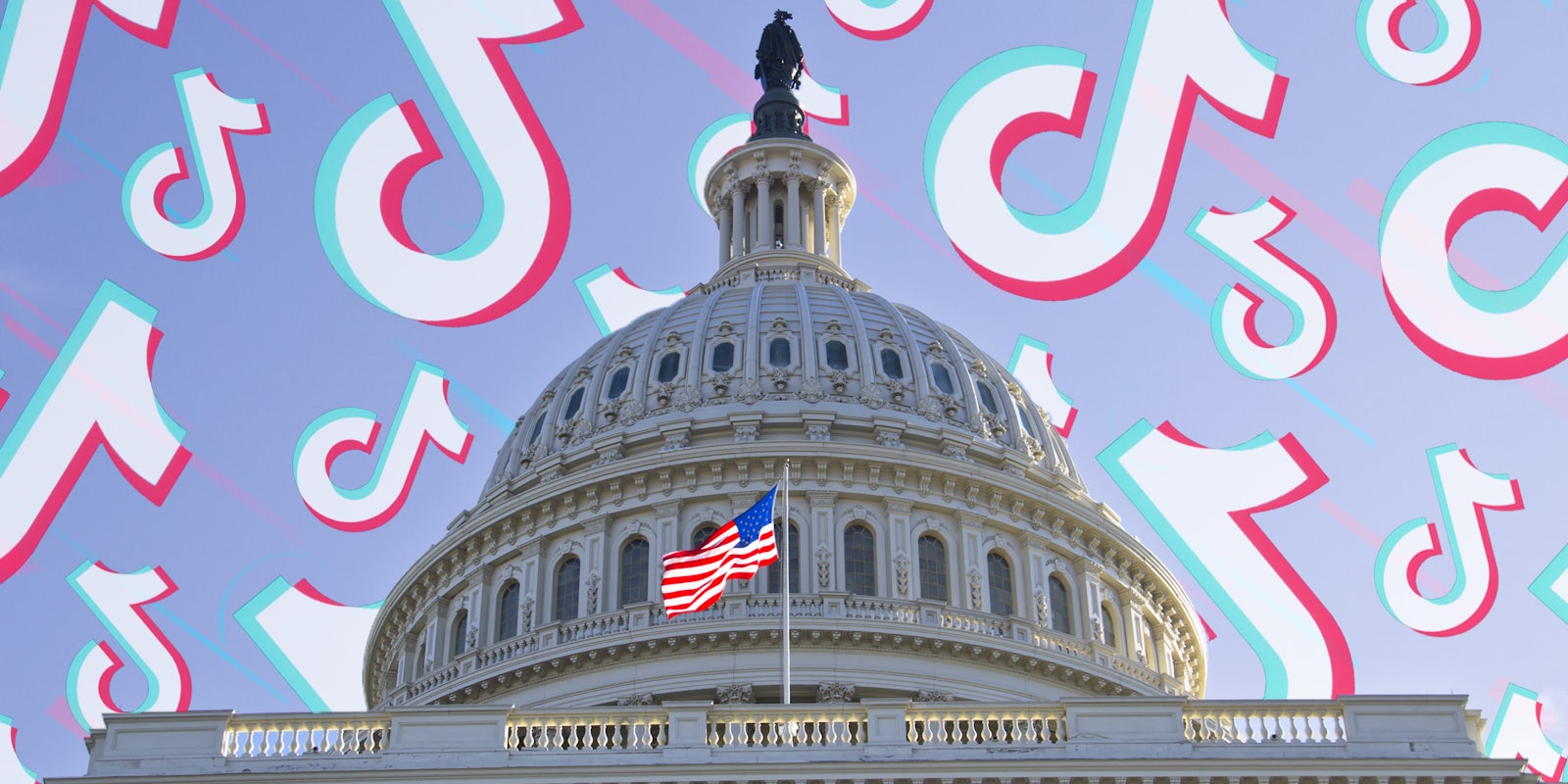Civil rights groups and journalists alike sounded the alarm this week that a new bipartisan bill could ban TikTok from the U.S.—but what it’s really about is forcing a sale.
The Restricting the Emergence of Security Threats that Risk Information and Communications Technology (RESTRICT) Act was introduced by Sen. Mark Warner (D-Va.) and Sen. John Thune (R-S.D.) on Tuesday. The bill would allow the Department of Commerce to review and possibly ban any technologies where U.S. user data interacts with a “foreign adversary … and poses undue or unacceptable risk to national security,” according to a statement announcing the bill.
The bill never mentioned TikTok by name, but it is clearly aimed at the popular Chinese-owned brand. In a Fox News interview, Warner even said explicitly the bill could be used to ban TikTok.
The White House almost immediately signaled its support of the RESTRICT Act when it was announced, calling on Congress to act swiftly.
But, as the fervor around the bill has grown, critics and experts have begun to point out that given how the legislation is written, something else may be at hand.
Michael Sobolik, a fellow at the American Foreign Policy Institute, noted out a distinct carveout in the legislation that seems to involve TikTok.
“If this thing passes, the chances of a TikTok ban or forced divestment grow incredibly small,” he said in a tweet. “Why? The bill slow-walks action against transactions under CFIUS review. TikTok is currently under CFIUS review.”
The Committee on Foreign Investment in the United States (CFIUS) has a review process to investigate foreign investment with possible national security risks and TikTok has been under review since ByteDance bought U.S. company Musical.ly back in 2017.
Just last month, Sen. Richard Blumenthal (D-Conn.) and Sen. Jerry Moran (R-Kan.) sent a memo to Janet Yellen, Treasury Secretary and Chair of CFIUS, urging the panel to wrap up its investigation and impose restrictions on TikTok.
“CFIUS has the power to block, or order the divestment of, foreign acquisitions of American companies or technologies, including on the basis of protecting the sensitive personal data of consumers,” Blumenthal said in the letter.
Blumenthal said the interagency task force should implement strict regulations on TikTok.
“We urge prompt action by CFIUS to protect consumers and our national security through concluding the investigation underway and imposing strong remedies to separate ByteDance from TikTok’s American users,” he said. “The Committee should not put its imprimatur on a deal with TikTok if it cannot fully ensure our personal data and access to information is free from spying and interference from the Chinese government.”
Evan Greer, director of digital rights group Fight for the Future, said in a statement to the Daily Dot that they believe the CFIUS review and stipulation in the RESTRICT Act could lead to a sale of TikTok, but also said the CFIUS review carveout could be an “escape hatch” for Biden to balk at a ban, depending on the outcome of the review.
“Part of the goal of all of this is to use the CFIUS process to sort of bully ByteDance into selling TikTok to a U.S. company. It’s unclear how likely or feasible that is,” Greer said.
In a statement to the Daily Dot, Warner’s office alluded to doing just that.
“The RESTRICT Act actually strengthens the federal government’s hand, creating a more robust backstop—such as an outright ban—if TikTok sought to challenge or refuse to comply with a divestiture order,” they said.
Thune’s office did not respond to a request for comment.
This is not the first time a TikTok sale has come up. In 2020, the Trump administration said it would ban TikTok if ByteDance didn’t sell to an American company. The administration didn’t follow through and TikTok said it stopped hearing from them.
While a sale seems possibly the most likely outcome, there are still concerns about the structure of a bill Biden wants rushed through Congress.
Greer noted the bill could also allow the U.S. to act against companies that do business on foreign soil.
“That could certainly give the president (and keep in mind, future presidents) the authority to ban TikTok, but could also potentially sweep in other companies like Apple that do significant business in China and build technology there,” they said.
David Greene, Senior Staff Attorney and Civil Liberties Director at the Electronic Frontier Foundation (EFF), said the legislation would face First Amendment scrutiny if passed.
“To the extent the law sets up a system for the government to identify whether any foreign-owned communications technology presents unacceptable risks to U.S. persons, that is generally permissible,” he said in a statement to the Daily Dot. “But if this law is enacted and its procedures are used to decree that a U.S. person cannot use a certain communications technology—messaging app, social media service—because of its foreign ownership, then that decree will have to survive First Amendment scrutiny.”
Greene also said that a portion of the law that defines what will and will not be released to the public from a review of a given media company is far too vague.
“I would like to see this bill have more robust transparency requirements,” he said. “The provision … for Published Explanations has way too much room for the government to wiggle out of publicly reporting the bases for any punitive decisions it makes under this regime. Full public reporting should be the required default, [with] few, if any, exceptions specified in the law.”
Greer said that regardless of the legality of the legislation or whether it will stand up to lawsuits, the bill misses the point.
“Regardless, our take is that all of this is a ridiculous and unserious distraction,” they said. “If lawmakers want to protect Americans from surveillance and data abuse they should pass a … privacy law instead of spreading moral panic and calling for authoritarian censorship of an app used by more than 100 million people in this country alone.”

